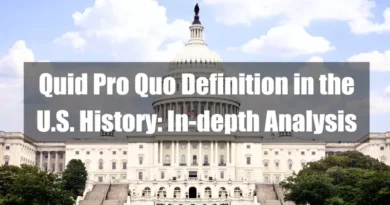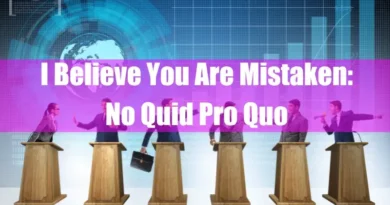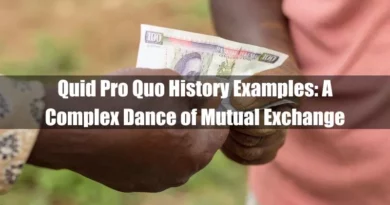Quid Pro Quo Definition for Government: In-Depth Analysis
Takeaways
| Key Points |
|---|
| In government and politics, “quid pro quo” refers to an exchange where one party provides something of value in return for a benefit or favor from another. |
| While the term itself means “something for something,” it is often used in discussions about potential corruption, where an official might offer favors, such as favorable legislation or government contracts, in return for personal gains, such as campaign donations or bribes. |
| While quid pro quo is not inherently illegal, it becomes problematic when it involves bribery or unethical practices, which can lead to legal consequences, especially if it undermines fairness or public trust. |
Introduction
The phrase quid pro quo, originating from Latin, translates to “something for something.” In everyday terms, it refers to an exchange where one party provides something of value in return for something else. While this exchange principle is common in many areas, such as business and contracts, it takes on a particularly significant and complex role when applied to government and politics. The term is often associated with corruption, public mistrust, and the potential for unethical behavior, especially when it concerns public officials and their duties.
Definition and Legal Context
In government, quid pro quo typically refers to exchanging a benefit between a public official and another party, often in return for a specific action, such as policy changes, government contracts, or political favors. The exchange can involve monetary value or non-monetary benefits like political influence or votes.
The critical aspect distinguishing a legitimate exchange from a corrupt one is whether the action conflicts with public duties or compromises the official’s obligations to serve the public interest.
In the legal context, quid pro quo becomes problematic when it involves bribery or corruption, particularly when the official act or policy change is carried out in response to personal gain. For example, if a government contractor makes a large campaign donation to a politician, and the politician subsequently awards that contractor a lucrative contract, this could be considered a corrupt quid pro quo if the donation influenced the decision. U.S. laws, including federal bribery statutes, specifically address these situations to prevent misuse of public office for private gain.

Notable Example
A well-known example of a quid pro quo arrangement in recent U.S. political history was the 2019 impeachment inquiry into then-President Donald Trump. The inquiry centered around allegations that Trump withheld military aid to Ukraine in exchange for an investigation into his political rival, Joe Biden. The case became a prime example of how quid pro quo can be scrutinized in political and legal contexts, highlighting the fine line between political bargaining and unlawful or unethical conduct.
While Trump was acquitted by the Senate, the case sparked widespread debate about the role of quid pro quo in international relations and presidential power. Critics argued that such exchanges if proven, amounted to an abuse of power, while supporters contended that political negotiations with foreign nations often involve conditional agreements and mutual benefit.
Forms of Quid Pro Quo in Government
Political Donations and Favorable Treatment
One of the most common forms of quid pro quo in the political arena involves political donations. This occurs when wealthy individuals, organizations, or businesses donate money to political campaigns in exchange for favorable legislation or government contracts. While campaign contributions are a legitimate part of the political process, they become problematic if a clear and explicit connection can be drawn between the donation and subsequent actions by the public official that benefit the donor directly.
Logrolling
Another form of quid pro quo in government is logrolling, a practice where legislators trade support on different bills to ensure the passage of legislation that benefits them or their constituents. For instance, a senator might agree to vote for another senator’s bill in exchange for reciprocal support on their own. While this practice is common and often seen as part of the legislative bargaining process, it can become unethical if it involves personal gains or undermines the legislative process’s transparency and fairness.
Corruption and Bribery
Corruption in government often involves quid pro quo arrangements, where public officials misuse their positions for personal benefit. For instance, accepting bribes in exchange for awarding contracts, passing favorable laws, or making decisions that benefit specific individuals or companies is considered a severe breach of public trust. Bribery laws at the federal and state levels are designed to penalize such behavior and ensure that public officials act in the public’s best interests.
Chief Justice John Roberts highlighted the term’s importance in campaign finance law, stating that any regulation must focus on preventing quid pro quo corruption or its appearance. This legal standard ensures that campaign contributions, for example, are not improperly influencing policy decisions. The 2014 Supreme Court decision emphasized that legitimate political contributions are not inherently corrupt but that legal scrutiny intensifies when money is exchanged for specific political actions or benefits.

Ethical Considerations in Quid Pro Quo
The concept of quid pro quo raises significant ethical questions, particularly about the balance between political negotiation and corruption. Not every exchange of favors in politics is inherently unethical. For example, legislators routinely negotiate and make compromises to pass laws. However, when these exchanges involve personal or financial gain for the parties involved, they can undermine public trust and the integrity of democratic institutions.
Transparency distinguishes acceptable political negotiations from corrupt quid pro quo arrangements. When agreements are made behind closed doors, without public oversight or clear ethical guidelines, they can erode the public’s trust in their government.
Ethical frameworks in politics and governance demand that public officials act in the public’s best interests rather than for personal gain or the advantage of a select few.
Conclusion
Quid pro quo is a concept deeply embedded in political, legal, and ethical discussions about government conduct. While exchanges of favors and benefits are a normal part of human interaction and political negotiation, in government, they must be conducted with transparency and integrity to avoid the appearance of corruption or abuse of power.
U.S. laws and ethical standards are designed to ensure that quid pro quo arrangements do not compromise public trust or the responsibilities of public officials. Maintaining this balance is critical to the health of democratic institutions and public confidence in governance.
FAQ
What is the legal definition of “quid pro quo” in government contexts?
In legal terms, “quid pro quo” refers to an arrangement where a government official receives something of value in exchange for performing or refraining from an official act. This concept is central to bribery laws, where the prosecution must demonstrate a direct link between the benefit received and the official action taken.
How does “bribery” relate to quid pro quo in government?
Bribery involves offering, giving, receiving, or soliciting something of value to influence the actions of a public official. It requires a quid pro quo arrangement, meaning there must be a clear exchange where the official’s actions are influenced by the benefit received.
What constitutes an “official act” under bribery statutes?
An “official act” is a decision or action on a matter involving the formal exercise of governmental power. The U.S. Supreme Court in McDonnell v. United States clarified that setting up meetings, calling another public official, or hosting events do not qualify as official acts unless they are directly related to a formal exercise of governmental power.
Can you explain the term “gratuity” in the context of government ethics?
A “gratuity” refers to a payment or favor given to a public official for an action they have already taken or committed to take, without a prior agreement. Unlike bribery, gratuities do not require a quid pro quo arrangement. However, accepting gratuities can still be unethical and, in some jurisdictions, illegal.
What is the “stream of benefits” theory in corruption cases?
The “stream of benefits” theory posits that a series of benefits given to a public official over time can constitute bribery, even if no specific quid pro quo is identified for each benefit. The ongoing relationship implies an understanding that the official’s actions will be influenced by the continuous receipt of benefits.
How does the “honest services fraud” statute apply to quid pro quo arrangements?
“Honest services fraud” criminalizes schemes to deprive others of the intangible right to honest services, typically involving public officials who accept bribes or kickbacks. In such cases, the prosecution must prove a quid pro quo where the official’s actions were influenced by personal gain, violating their duty to provide honest services to the public.
What role does “intent” play in proving quid pro quo corruption?
Proving intent is crucial in quid pro quo corruption cases. The prosecution must demonstrate that the public official knowingly and willfully engaged in an exchange where their official actions were influenced by the benefit received. Without evidence of corrupt intent, establishing a quid pro quo arrangement becomes challenging.
Can “campaign contributions” be considered quid pro quo corruption?
Campaign contributions can be deemed quid pro quo corruption if there is explicit evidence that the contribution was made in exchange for a specific official action. The U.S. Supreme Court has held that only contributions with a clear quid pro quo arrangement constitute corruption; general contributions without such agreements are protected under the First Amendment.
How does the “Foreign Corrupt Practices Act (FCPA)” address quid pro quo?
The FCPA prohibits U.S. individuals and businesses from bribing foreign officials to obtain or retain business. It targets quid pro quo arrangements where something of value is offered to influence an official act or decision, ensuring fair competition and ethical business practices abroad.
What is the “Hobbs Act” and its relation to quid pro quo?
The Hobbs Act criminalizes extortion by public officials, defined as obtaining property from another, with their consent, under color of official right. This includes situations where officials demand or accept payments in exchange for official actions, effectively constituting a quid pro quo arrangement.
How does “lobbying” differ from illegal quid pro quo arrangements?
Lobbying involves advocating for specific policies or decisions by providing information and arguments to public officials. It becomes illegal when it crosses into quid pro quo territory, where something of value is offered or exchanged for a specific official action, thereby constituting bribery or corruption.
What is “pay-to-play” in government contracting?
“Pay-to-play” refers to practices where businesses make contributions or payments to government officials or political campaigns to secure government contracts or favorable treatment. Such arrangements often involve quid pro quo agreements and are considered unethical and, in many jurisdictions, illegal.
Can “patronage” systems lead to quid pro quo corruption?
Patronage involves appointing individuals to government positions based on political support or affiliations rather than merit. While not inherently illegal, patronage systems can lead to quid pro quo corruption if appointments or benefits are exchanged explicitly for political favors or contributions.
How does “regulatory capture” relate to quid pro quo?
Regulatory capture occurs when regulatory agencies act in favor of the industries they are supposed to regulate, often due to undue influence or relationships. While not always involving explicit quid pro quo arrangements, regulatory capture can result from or lead to such corrupt exchanges, undermining regulatory integrity.
What defenses are commonly used against quid pro quo corruption charges?
Defendants in quid pro quo corruption cases often argue lack of intent, asserting that there was no corrupt agreement or that the benefits exchanged were legitimate and unrelated to official actions. They may also challenge the definition of “official act” or claim that the prosecution lacks concrete evidence of a quid pro quo arrangement.









